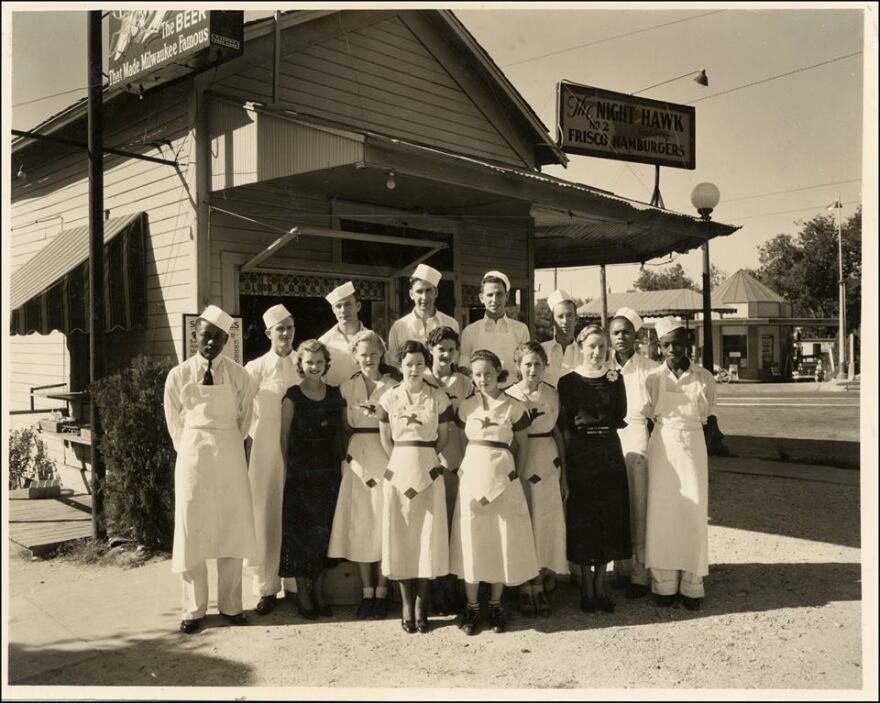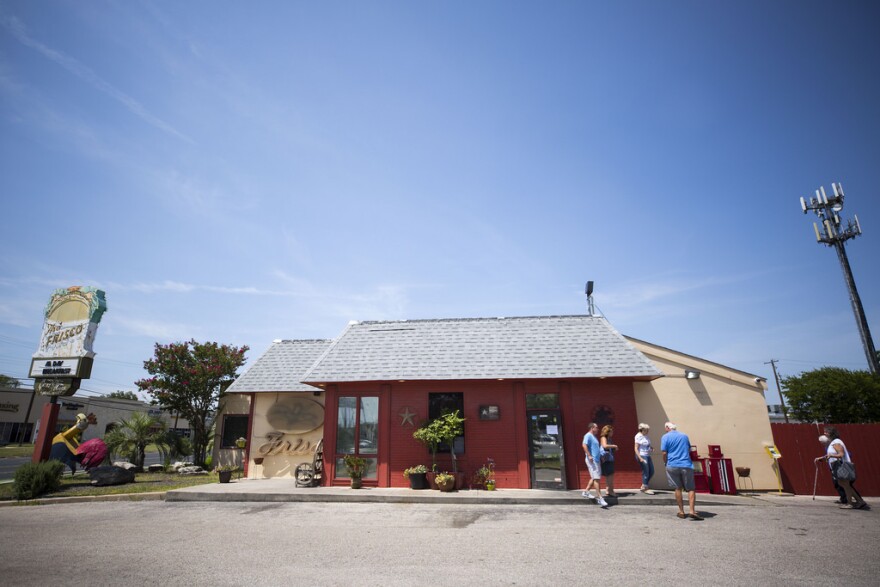On Monday, Julie Brown heard a voice beckoning her to get a piece of pie.
She listened, stopping at The Frisco on Burnet Road and ordering a piece of coconut pie – just like her parents did when they first met decades ago.
“I happened to drive by and I had something in my mind,” she said. “I heard my mother’s voice – she passed away a few years ago – and I heard her voice say, ‘Go in there and get some coconut pie before they close.’”
The 65-year-old Austin institution and longest-running restaurant in the Night Hawk empire announced last week that it plans to close Sunday; Austinites have been coming in droves to pay their respects ever since.

Co-owner Harry Akin told KUT servers have been working double-shifts and business has been better than it has been in years, but it’s bittersweet seeing so many longtime customers show up for a final meal.
He was also surprised by all the newcomers.
“I have incidentally encountered an astonishing number of persons who’ve never been to the restaurant before, but who decided to come in when they saw the story of our closing,” he said. “And that’s ironic in a way, but it’s been an astonishing number of persons.”
Akin’s uncle, also named Harry, founded the first Night Hawk on South Congress Avenue and Riverside Drive in 1932. Over the next 40 years, he grew the business to seven locations, including two in San Antonio, and parleyed that success into a nationally distributed frozen-food empire. The younger Akin says his uncle was well known for his charm and enthusiasm, as well as his catch phrases.
“Well, probably the best known is ‘There’s nothing accidental about quality,’” Akin said. “Uncle Harry was a maniac on the subject of quality.”
Indeed, Harry Akin was a fanatic about the quality of the beef served in the Night Hawks’ signature Frisco Burgers and Top Chop’t steaks. For a time, he raised cattle on a farm on the Colorado River to sell in his restaurants. He also filmed a series of commercials in the early 1960s touting his beef-production process.
“Since no other establishments have been invested with the Top Chop’t formula or authorized to merchandize and serve it in the Night Hawk manner, we think it’s only fair to suggest that only in a Night Hawk restaurant can you expect to be served a real, bonafide Top Chop’t steak, the kind that’s truly famous for that sirloin flavor,” the elder Akin said in a Night Hawk commercial.

In Austin, the Night Hawk restaurants were arguably most famous for their progressive service and employment policies. Akin was a strong believer in equal rights, and he raised eyebrows – and lost customers – when he desegregated his locations and instituted a policy that gave management positions to black people and women.
“There were people, though, in Austin who held a grudge against my uncle for the rest of their lives because he forced them to integrate,” his nephew said.
In early June 1963, Harry Akin and other restaurateurs went to the White House to discuss desegregating the service industry. A few days later, President John F. Kennedy called on Congress to act.
According to the Austin American-Statesman, that same week Akin got 16 other Austin restaurant owners to sign an integration pact to open their facilities to everyone “regardless of race, color or creed.”
Once the movement started, the younger Akin says, others got on board.
“Some held out for a time, but they had to give in.”
After that, Akin went on to lead the National Restaurant Association, before being elected to an Austin City Council seat and, eventually, serving as mayor from 1967 to 1969.
Eddie Wilson, who owns and operates both Threadgill’s restaurants in Austin, says Akin was a mentor in many ways.
“That was one of the reasons he was a hero to a lot of us,” he said, adding that Akin’s open-door policy extended to Austin’s weirder counterculture-minded denizens and hippies, who had trouble getting service in the '70s.

“So when we went over [to the Night Hawk on Congress] in that early-Austin hippie cowboy drag, it was a pretty strange mix,” Wilson said. “We were outcasts everywhere, but the Night Hawk back in those days and then we all just kinda melded into one.”
Wilson says his own business and other legacy restaurants in Austin are in the same boat now as The Frisco, facing similar financial challenges.
“That same boat is taking on water for me right now, too,” he said. “You know the taxes have gotten so high that the existence of the downtown Threadgill's is ... we’re not going to be there forever.”
Akin says his property taxes have spiked, as well, tripling in the last five years. It’s made running The Frisco unsustainable, but he’s also been challenged by the changing tastes in Austin and the explosion of new restaurants in recent years.
“We’ve focused on attracting the younger people, and I think we’ve done a pretty good job with that,” he said. “Our clientele has evolved toward younger and younger, but apparently not a good enough job.”
Still, Akin says, the business has achieved more than his uncle could have ever imagined.

“We’ve had a tremendous run. Sixty-five years for this business is really quite remarkable,” he said.
Though The Frisco will be closing for good after dinner service Sunday, the Night Hawk will still live on. Night Hawk Foods, which split from the company in 1989, still makes frozen Top Chop’t steaks and other entrées for grocery stores at its facility just down the road in Buda.





